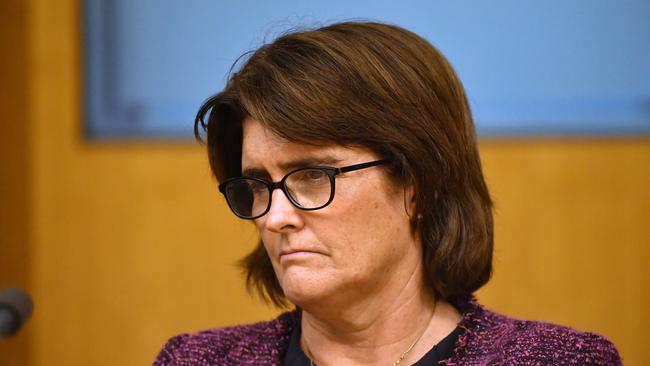RBA deputy governor Michele Bullock says quantitative easing ‘helped at the margin’
The RBA’s rapid-fire interest rate increases haven’t taken monetary policy into ‘restrictive territory’ but significant bond buying will only occur in ‘extreme circumstances’.
Reserve Bank deputy governor Michele Bullock set a high bar for future bond buying programs by the central bank and also indicated that rapid-fire interest rate increases by the nation’s central bank were yet to take monetary policy into “restrictive territory”.
She also noted that while the Reserve Bank would incur a large accounting loss and negative equity for the current financial year resulting from valuation losses on its bond holdings, this was unlikely to impact the RBA’s ability to operate.
At a Bloomberg event after the release of an internal review of its 15-month program that found benefits to the economy and the government’s fiscal position from its Bond Purchase Program, known as quantitative easing, she said it would only be considered again “in extreme circumstances” when the cash rate target had been “lowered as far as possible”.

Royal Bank of Canada chief economist Su-Lin Ong said: “In the post Covid-19 world, the RBA’s toolkit has been expanded, but unconventional tools including yield curve control and bond purchase programs will only be deployed in extreme circumstances and when the conventional cash rate tool has been exhausted.
“The review implies that the risk-reward assessment is challenging.”
After the speech, the RBA deputy governor said quantitative easing had only “helped at the margin”.
Ms Ong said that was a “curious turn of phrase” after the release of the RBA’s review which defended bond buying and the potential costs of the program, but it “likely underscores the RBA’s reluctance to adopt these measures again”.
While further use of unconventional policy, as seen in other countries, might give the RBA more experience and confidence in using such tools, it might also have concerns that using them again would be a sign of shock and impending recession.
“The RBA will be hoping that such circumstances do not arise again that demand the deployment of unconventional policy,” Ms Ong said.
When asked whether interest rates had now reached a point where they were slowing the economy, Ms Bullock indicated that while rates weren’t yet in “restrictive territory” the RBA was looking for “opportunities” to slow the pace of rate hikes.
“In real time, I would hesitate to give a guess as to what the neutral rate may be (but) I’m not sure if it’s (the cash rate) in restrictive territory just yet,” she said.

“We’ll be looking to see whether or not there are opportunities to taper a bit, and slow the pace. We are not on a preset path.”
It came as Deutsche Bank became the latest private sector forecaster to lift its expectation of the next move by the RBA to a 50 basis point rise from 25bps previously forecast. Deutsche continued to expect 25bps rises at each of the November and December meetings, but now saw a terminal rate of 3.35 per cent from 3.1 per cent previously.
The RBA has so far boosted the cash rate to 2.35 per cent from 0.1 per cent in May, which is the most aggressive rate hiking cycle among the world’s central banks.
But unlike the US, which is expected to face another massive interest rate increase overnight, Australia’s central bank has emphasised the need to keep the economy “on an even keel”.
Ms Bullock said a key difference was that wages hadn’t taken off in Australia.
“Inflation isn’t as high here as elsewhere” and particularly when compared with the UK/Europe, Australia’s wage growth was lower and there was “less momentum” in inflation psychology in Australia.
“There’s much more an underlying momentum in inflation psychology in those countries,” she said.
As for the monthly CPI data to be released by the ABS next Tuesday, she said: “There’s a little bit of water under the bridge to go with monthly CPI numbers” and they were “unlikely” to have major implications for the RBA’s October board meeting given it was a new data release, and more time would be needed to assess its “noise versus information”.
“Our forecast for inflation is to peak at 7¾ to 8 per cent early into next year,” she said.
“Those are the numbers that we are currently working with.”
The bank’s revised economic forecasts are due to be released in November.
Ms Bullock also cautioned on the growth prospects for China, the US and Europe.
“The outlook for the global economy is looking quite uncertain and quite worrying, and that obviously has implications for us,” she said.
“This is something at the moment that is very uncertain and on a bit of a knife edge.”
She said the RBA had no plans to sell the bonds it bought under its quantitative easing program.
In its review of its bond-buying program, the RBA said the board had agreed to strengthen the way it considered a wide range of scenarios when making monetary policy decisions in future, particularly when it came to unconventional measures like bond buying.








To join the conversation, please log in. Don't have an account? Register
Join the conversation, you are commenting as Logout